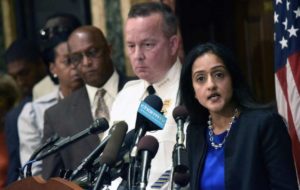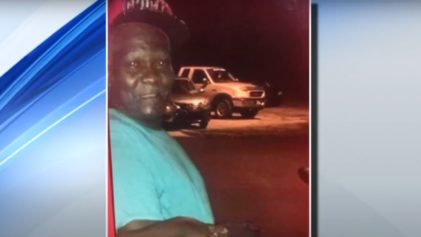
Principal Deputy Assistant Attorney General Vanita Gupta, right, speaks during a news conference as Police Commissioner Kevin Davis, second from right, and City Council president Bernard C. Jack Young listen at City Hall in response to a Justice Department report, Wednesday, Aug. 10, 2016 in Baltimore. The Justice Department and Baltimore police agreed to negotiate court-enforceable reforms after a scathing federal report released Wednesday criticized officers for using excessive force and routinely discriminating against Blacks. (Kim Hairston/The Baltimore Sun via AP)
If there is anything that the public learned this week, it is that the Baltimore Police Department is in a bad way, with its officers engaged in sexual abuse of members of the public. The U.S. Department of Justice released its 163-page report uncovering its findings on the patterns and practices of the city’s law enforcement agency, and its widespread civil rights violations.
According to the Justice Department, BPD violates the Constitution and federal law by engaging in a pattern or practice of: “(1) making unconstitutional stops, searches, and arrests; (2) using enforcement strategies that produce severe and unjustified disparities in the rates of stops, searches and arrests of African Americans; (3) using excessive force; and (4) retaliating against people engaging in constitutionally-protected expression.”
Further, the pattern and practice is fueled by what the DOJ calls “systemic deficiencies in BPD’s policies, training, supervision, and accountability structures that fail to equip officers with the tools they need to police effectively and within the bounds of the federal law.”
The police department fails to provide its officers with training and adequate policy guidance, and does not hold them accountable for misconduct. Further, the report concludes that the BPD does not compile or analyze data on police officers’ activities, and fails to furnish them with the necessary resources and equipment to police safely, constitutionally and effectively.
The deficiencies the DOJ found are many, not the least of which is evidence that Baltimore police officers engage in criminal behavior of a sexual nature, amounting to an abuse of power. This includes complaints from the public that “some officers target members of a vulnerable population—people involved in the sex trade—to coerce sexual favors from them in exchange for avoiding arrest, or for cash or narcotics.”
Moreover, not only did the DOJ find evidence of the misconduct, but the BPD failed to adequately address such allegations, and allowed the activity to recur. In one case, a cop was a repeat offender in such misconduct, and not only was he not prosecuted, but ultimately he was allowed to resign from the force:
For example, BPD investigators became aware of one officer’s alleged misconduct in March of 2012 when they conducted a “prostitution initiative” “for the purposes of gathering intelligence and obtaining confidential informants relating to police corruption.” One of the women interviewed informed BPD investigators that she met with a certain officer and engaged in sexual activities in the officer’s patrol car once every other week “in exchange for U.S. Currency or immunity from arrest.” The Department administratively closed the case nine months later, without, it appears, referring the matter for criminal prosecution or interviewing the accused officer, or any other potential witnesses.
Ten months after closing the first investigation, the Chief of BPD’s Office of Professional Responsibility received an anonymous “Crime Stoppers” tip that the same officer was “having sex in his patrol vehicle” with a different person involved in the sex trade. The Department initiated a new investigation, and assigned the case to a different detective. One day after opening the investigation, an assistant state’s attorney directed the detective to subpoena the woman’s phone records for a six-month period. The detective waited more than a month to do so, and then did not review those records for another six months, until May of 2014. The records confirmed that the officer and the woman exchanged 237 text messages and five phone calls in the six-month period for which records were subpoenaed. Approximately four months later, the State’s Attorney’s Office declined to prosecute the officer, though BPD’s administrative investigation remained open.
Four months after the State’s Attorney’s Office declined to prosecute, in February of 2015, BPD received a third, new tip that the same officer was engaging in sexual activities with the same woman involved in the sex trade who was mentioned in the “Crime Stoppers” tip. The new tip came from a neighboring Police Department, which interviewed the woman and subpoenaed her phone records in the course of an investigation. Though BPD’s administrative investigation into the “Crime Stoppers” tip remained open, BPD opened a third, separate investigation into the new tip, assigning a new, third detective to investigate the same officer’s conduct. The case was assigned “low” priority. The third BPD detective attempted to interview the woman but postponed the interview because she was in ill health. Two days later, the woman passed away. The investigators finally reviewed the officer’s phone records, which indicated that the officer had exchanged text messages—some sexually explicit—with several other women whose numbers were linked to online profiles for sex trade services. Finally, months later, Department investigators interviewed the officer two times in connection with the two open investigations. The allegations resulting from the “Crime Stoppers” tip and the third investigation were eventually sustained in the fall of 2015, based largely on the evidence provided by the neighboring Police Department. The officer was allowed to resign from BPD. It is unclear from BPD’s files whether any state authorities were notified of the officer’s sexual misconduct.
What is particularly troubling about such cases — in which the Baltimore police fail to properly investigate allegations of their own sexual misconduct — is the backdrop of allegations of gender bias in the department. Although the report did not yet find reasonable cause to conclude the BPD engages in gender-biased policing in violation of federal law, the allegations cause concern that gender bias is impacting Baltimore’s handling of sexual assault cases. The DOJ is also concerned that police interactions with transgender people and women who are sexual assault victims involve illegal gender discrimination.
As Vox reported, police sexual misconduct is an all-too-common occurrence. After excessive force, sexual misconduct is the second most prevalent form of police misconduct, according to the Cato Institute’s National Police Misconduct Reporting Project.
According to the National Center for Women & Policing, at least 40 percent of officer families nationwide experience domestic violence, as opposed to 10 percent among the general population. The organization noted that even police officers who are found guilty of domestic violence usually are not terminated, arrested or prosecuted, placing in question the ability of law enforcement to effectively police themselves. And while domestic violence among NFL players has gained much attention in recent years, The Atlantic found that domestic violence among professional football players is less than the general population, while the police have a much larger abuse issue than does the NFL. As Cosmopolitan found, there may be a good reason that domestic abuse victims do not call the police.
“Calling the police is a lifesaver for many women. But many hesitate because they don’t want their partner to go to jail, or because they fear calling may escalate the violence, or because they don’t trust that the police won’t themselves act violently — a legitimate fear, especially in communities of color and for LGBT victims of violence,” according to an investigation by Cosmopolitan. “Police can sometimes be insensitive or even hostile to abuse victims, and making a police report can set into motion a series of events that a victim finds confusing and disempowering, or that lead to more violence.” And what does one do when the police are the ones perpetrating the violence?
In addition, the Associated Press found last year that 1,000 police officers were forced to turn in their badges due to sexual misconduct, 550 for sexual assault, and 440 for other crimes such as sexting minors, on-the-job intercourse and child pornography. The death in police custody of Sandra Bland and others, and the multiple rape convictions of former Oklahoma City police officer Daniel Holtzclaw highlight the dangers women — particularly Black women — face when they come in contact with the police. This latest report on the Baltimore Police Department continues to shine a light on a serious issue.


